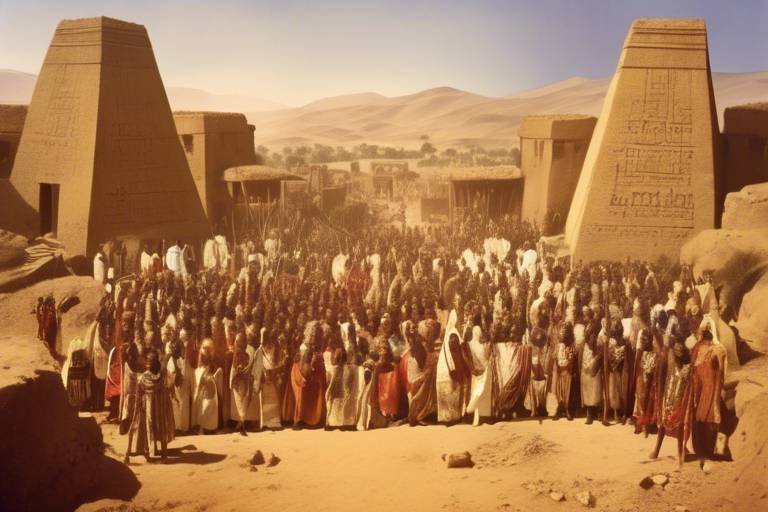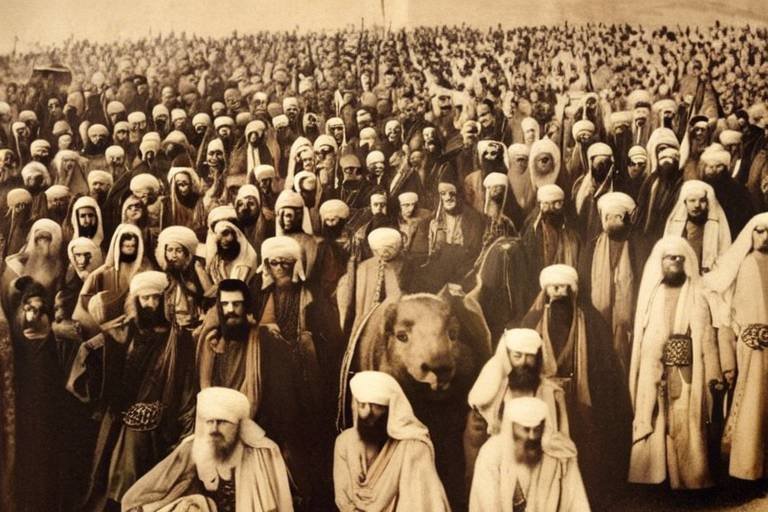The Decline of the Kingdom of Aksum - Historical Perspectives
The Kingdom of Aksum, once a powerful and influential civilization in ancient Africa, experienced a gradual decline that reshaped the region's historical landscape. This decline, shrouded in mystery and intrigue, was influenced by a multitude of factors that intertwined to bring about the kingdom's eventual downfall.
As we delve into the historical perspectives surrounding the decline of the Kingdom of Aksum, we are confronted with a tapestry of economic challenges, political instability, environmental changes, religious shifts, external invasions, and cultural transformations that collectively contributed to the kingdom's waning power.
At the heart of Aksum's decline lay economic challenges that eroded its once-thriving trade networks and depleted vital resources. The shifting of trade routes away from the region and the exhaustion of key economic reserves weakened the kingdom's economic foundations, leaving it vulnerable to external pressures.
Political instability further exacerbated Aksum's troubles, with succession crises, internal power struggles, and the gradual weakening of central authority sowing seeds of discord within the kingdom. These internal conflicts weakened Aksum's ability to govern effectively and respond to external threats.
Environmental changes also played a pivotal role in the kingdom's decline, as factors like climate change and deforestation altered the landscape and disrupted agricultural practices. These environmental shifts strained Aksum's resources and added pressure to an already fragile socio-economic system.
Moreover, religious shifts, particularly the kingdom's conversion to Christianity, brought about significant social and political changes that reshaped Aksum's identity. The implications of this religious transformation reverberated throughout the kingdom, influencing its cultural practices and societal structures.
External invasions, fueled by conflicts with neighboring regions and military conquests, further weakened Aksum's defenses and hastened its decline. The kingdom's inability to repel external threats and protect its borders marked a turning point in its history.
Cultural transformations, reflected in changes to art, architecture, and language, mirrored the declining power and influence of the Kingdom of Aksum. These cultural shifts symbolized a changing society grappling with the challenges of a shifting political and economic landscape.
Despite its decline, the legacy of the Kingdom of Aksum endures, with its contributions to trade, architecture, and the spread of Christianity leaving a lasting imprint on the history of Africa. The remnants of Aksum's past continue to shape the region's cultural and historical narratives.
Historiographical debates surrounding the decline of the Kingdom of Aksum offer a window into the complexities of interpreting its history. Diverging perspectives and theories shed light on the nuanced factors at play in the kingdom's downfall, inviting further exploration and analysis.

Economic Challenges
The economic challenges faced by the Kingdom of Aksum played a significant role in its eventual decline. One of the key factors contributing to this decline was the shift of major trade routes away from the region. As trade routes changed, Aksum's position as a prominent trading hub weakened, leading to a decline in revenue and economic prosperity. The depletion of natural resources also posed a challenge to the kingdom, affecting its ability to sustain its economy and support its growing population.
Furthermore, the reliance on trade for economic stability made the Kingdom of Aksum vulnerable to fluctuations in the global market. Changes in trade patterns and the emergence of new trade routes bypassing Aksum had a detrimental impact on the kingdom's economy, leading to a gradual economic downturn. This economic instability, coupled with internal challenges, created a precarious situation for Aksum's financial well-being.
Additionally, the reliance on agriculture as a primary economic activity left the kingdom susceptible to environmental changes. Deforestation and soil degradation, possibly exacerbated by climatic shifts, affected agricultural productivity and further strained the economy. The inability to adapt to these environmental challenges added to the economic woes faced by the Kingdom of Aksum.
In an attempt to address these economic challenges, the kingdom may have faced internal conflicts over resource allocation and economic policies. The struggle to maintain a balance between sustaining economic growth and meeting the needs of the population could have contributed to political instability and social unrest, exacerbating the economic downturn.

Political Instability
Political instability played a significant role in the downfall of the once powerful Kingdom of Aksum. The kingdom faced numerous challenges related to internal power struggles, succession crises, and the weakening of central authority. Succession disputes often led to violent conflicts among competing factions vying for control, destabilizing the political landscape. The lack of a clear line of succession and the absence of strong leadership further exacerbated the instability within the kingdom.
Internal power struggles among the nobility and regional governors also contributed to the political turmoil in Aksum. Competing interests and rivalries led to factionalism and infighting, weakening the overall governance structure. The inability to maintain unity and cohesion among the ruling elite weakened the kingdom's ability to effectively govern and respond to external threats.
The weakening of central authority in Aksum further exacerbated the political instability. Decentralization of power and the rise of regional autonomy eroded the kingdom's ability to enforce laws and maintain order. This fragmentation of authority created a power vacuum that was exploited by external forces seeking to expand their influence in the region.
Moreover, the lack of a strong central government made Aksum vulnerable to external invasions and incursions. Neighboring regions and rival powers took advantage of the kingdom's internal divisions to launch military campaigns and annex territories. The constant threat of external aggression further undermined the political stability of Aksum and hastened its decline.

Environmental Changes
The Kingdom of Aksum faced significant challenges due to environmental changes that impacted its sustainability and prosperity. Climate change played a crucial role in altering the landscape and agricultural productivity of the region. The shift in weather patterns, prolonged droughts, and erratic rainfall patterns disrupted the traditional farming practices of the Aksumites. As a result, crop yields decreased, leading to food shortages and economic strain within the kingdom.
Deforestation also contributed to the environmental degradation in Aksum. The extensive clearing of forests for agriculture, construction, and fuel exacerbated soil erosion and reduced biodiversity. The loss of forest cover not only affected the local ecosystem but also disrupted the water cycle, leading to water scarcity and desertification in certain areas. The diminishing natural resources further strained the kingdom's ability to sustain its population and economy.
Additionally, the environmental changes in Aksum had a cascading effect on the social and political dynamics of the kingdom. Competition over dwindling resources intensified, leading to conflicts and social unrest. The environmental degradation also impacted the kingdom's ability to maintain its infrastructure and support its growing population, contributing to internal instability and weakening central authority. The interconnectedness of environmental factors with economic and political aspects exacerbated the challenges faced by the Kingdom of Aksum.

Religious Shifts
Religious Shifts played a crucial role in the decline of the Kingdom of Aksum. One of the significant turning points was the conversion to Christianity, which had far-reaching implications for the kingdom's social and political structures. The adoption of Christianity not only altered the religious landscape but also influenced the governance and cultural practices of Aksum. Churches and monasteries became prominent features of the kingdom, reflecting the growing influence of the Christian faith.
Furthermore, the shift towards Christianity brought about changes in the relationship between the ruling elites and the clergy. The Church gained considerable power and influence, often intertwining with political affairs. This religious transformation reshaped the traditional power dynamics within Aksum, leading to shifts in authority and decision-making processes.
Moreover, the conversion to Christianity had implications for Aksum's external relations. The kingdom's ties with other Christian regions strengthened, creating new alliances and networks that influenced trade and diplomacy. The spread of Christianity also facilitated cultural exchanges and the dissemination of religious teachings, contributing to the kingdom's interconnectedness with the wider Christian world.
However, while the adoption of Christianity brought certain benefits, it also introduced internal tensions and conflicts. Religious differences and interpretations sometimes led to schisms and disputes within the kingdom, challenging the unity and stability of Aksum. These internal divisions, coupled with external pressures, contributed to the overall weakening of Aksum's political and social cohesion.
In summary, the Religious Shifts in the Kingdom of Aksum were not only about spiritual transformation but also had profound implications for the kingdom's governance, culture, and external relations. The conversion to Christianity marked a significant period of change and adaptation, shaping the course of Aksum's history and contributing to its eventual decline.

External Invasions
External invasions played a pivotal role in the decline of the once-mighty Kingdom of Aksum. The region faced numerous conflicts with neighboring territories and experienced military conquests that weakened its power and influence. These invasions not only resulted in the loss of territory but also disrupted trade routes and destabilized the political landscape of Aksum.
One of the significant external threats to Aksum came from the Kingdom of Kush, located to the south of Aksum. The rivalry between the two kingdoms escalated into military confrontations, leading to territorial losses for Aksum and a drain on its resources. Additionally, the Red Sea coast, a vital trade route for Aksum, faced incursions from various maritime powers, further hampering the kingdom's economic prosperity.
The decline of Aksum was also exacerbated by the expansionist ambitions of the Himyarite Kingdom from the Arabian Peninsula. The Himyarites sought to control the lucrative trade routes that passed through Aksum, leading to conflicts and ultimately contributing to the downfall of the once-thriving kingdom.
Furthermore, the arrival of new waves of migrants and invaders from the Arabian Peninsula and other regions added to the external pressures faced by Aksum. These groups brought with them different cultures, languages, and religious beliefs, further destabilizing the social fabric of Aksum and eroding its traditional power structures.

Cultural Transformations
When delving into the that took place within the Kingdom of Aksum, we witness a profound shift in various aspects of society that reflected the kingdom's declining influence. The artistic expressions, architectural styles, and language usage underwent significant changes during this period, mirroring the broader transformations occurring within the kingdom.
Artistically, the decline of Aksum saw a shift in the themes and styles depicted in the region's artworks. The once intricate and grandiose sculptures and monuments gave way to simpler and more utilitarian designs, indicating a waning focus on artistic expression and cultural pride. This shift in artistic representation symbolized the diminishing power and resources available to support elaborate artistic endeavors.
Architecturally, the Kingdom of Aksum experienced a noticeable change in the construction and design of buildings and structures. The grand edifices that once stood as symbols of the kingdom's wealth and power began to show signs of neglect and decay. The architectural landscape of Aksum transformed from grandeur to modesty, reflecting the economic and political challenges that plagued the kingdom during its decline.
Language, as a fundamental aspect of cultural identity, also underwent transformations within Aksum. The once dominant Ge'ez language, used for official and religious purposes, began to lose its prominence as other languages gained traction among the populace. This linguistic shift signified a broader cultural transformation as the kingdom grappled with internal strife and external pressures.
These cultural transformations not only served as visible markers of the Kingdom of Aksum's decline but also highlighted the interconnected nature of societal changes during periods of upheaval. The evolution of art, architecture, and language within Aksum reflected the shifting power dynamics and challenges faced by the kingdom as it navigated through turbulent times.

Legacy of Aksum
The legacy of the Kingdom of Aksum is deeply intertwined with the history of ancient Africa, leaving a lasting impact on the region that reverberates through the centuries. One of the most notable contributions of Aksum was its role as a major hub for trade, connecting diverse regions and facilitating the exchange of goods and ideas. The Aksumites' mastery of trade routes and their development of a sophisticated trading network positioned the kingdom as a key player in the global economy of the time.
Furthermore, the architectural achievements of Aksum continue to awe and inspire, with iconic structures like the towering obelisks and intricate stelae serving as tangible reminders of the kingdom's grandeur. These monumental creations not only showcased the artistic prowess of the Aksumites but also served as symbols of power and prestige, solidifying the kingdom's place in history.
Moreover, the Kingdom of Aksum played a pivotal role in the spread of Christianity in Africa, becoming one of the earliest Christian civilizations in the world. The conversion to Christianity had profound implications for Aksumite society, shaping its cultural practices, religious beliefs, and political structures. The enduring influence of Christianity in the region can be traced back to the legacy of Aksum and its embrace of this faith.
Despite its eventual decline, the legacy of the Kingdom of Aksum endures through its cultural contributions, architectural marvels, and economic impact. The echoes of Aksum's greatness can still be felt in the traditions, beliefs, and heritage of the people who inhabit the lands once ruled by this ancient kingdom.

Historiographical Debates
Historiographical debates surrounding the decline of the Kingdom of Aksum have sparked intense discussions among scholars and historians. One of the key points of contention revolves around the role of economic factors versus political instability in the kingdom's downfall. Some argue that the shift in trade routes and resource depletion played a more significant role, while others emphasize the impact of internal power struggles and succession crises.
Furthermore, there is ongoing debate regarding the influence of external invasions on Aksum's decline. While some historians attribute the kingdom's fall to military conquests and conflicts with neighboring regions, others argue that internal weaknesses and political turmoil were the primary causes. These differing perspectives highlight the complexity of analyzing historical events and the challenges of interpreting ancient sources.
Another point of debate centers on the environmental changes that may have affected Aksum. Climate change and deforestation are often cited as contributing factors to the kingdom's decline, but the extent of their impact remains a subject of scholarly disagreement. Some researchers suggest that environmental degradation played a crucial role, while others downplay its significance in favor of political and economic explanations.
Moreover, the religious shifts within Aksum, particularly the conversion to Christianity, have sparked discussions about the kingdom's social and political transformations. Scholars debate the implications of this religious change on Aksum's governance structure, cultural practices, and interactions with neighboring regions. The varying interpretations of these religious shifts underscore the complexities of studying ancient societies and their belief systems.
In conclusion, historiographical debates surrounding the decline of the Kingdom of Aksum reveal the multifaceted nature of historical inquiry. By examining economic, political, environmental, religious, and cultural factors, scholars strive to unravel the complex tapestry of events that led to the kingdom's eventual downfall. These debates not only shed light on the past but also invite us to question our assumptions and explore alternative narratives about the rise and fall of ancient civilizations.
Frequently Asked Questions
- What were the main economic challenges faced by the Kingdom of Aksum?
The Kingdom of Aksum faced economic challenges due to the shifting of trade routes away from the region and the depletion of natural resources, impacting its prosperity.
- How did political instability contribute to the decline of the Kingdom of Aksum?
Political turmoil, including succession crises and internal power struggles, weakened the central authority of Aksum, leading to instability and eventual decline.
- What role did environmental changes play in the downfall of the Kingdom of Aksum?
Environmental factors like climate change and deforestation may have affected agricultural productivity and resource availability, impacting the sustainability of the kingdom.
- Why was the conversion to Christianity significant for the Kingdom of Aksum?
The adoption of Christianity brought about social and political transformations in Aksum, influencing its cultural identity and relationship with neighboring regions.
- How did external invasions contribute to the decline of the Kingdom of Aksum?
External invasions and military conflicts with neighboring regions weakened Aksum's defenses and contributed to its eventual downfall as a dominant power in the region.
- What cultural transformations reflected the declining power of the Kingdom of Aksum?
Changes in art, architecture, and language in Aksum demonstrated a shift in cultural influence and power dynamics, mirroring the kingdom's declining status.
- What is the lasting legacy of the Kingdom of Aksum?
The legacy of Aksum includes contributions to trade networks, architectural achievements, and the spread of Christianity in Africa, leaving a significant mark on the region's history.
- What are some historiographical debates surrounding the decline of the Kingdom of Aksum?
Historical interpretations vary on the factors contributing to Aksum's decline, with debates focusing on economic, political, environmental, and cultural aspects, providing diverse perspectives on this historical event.



















